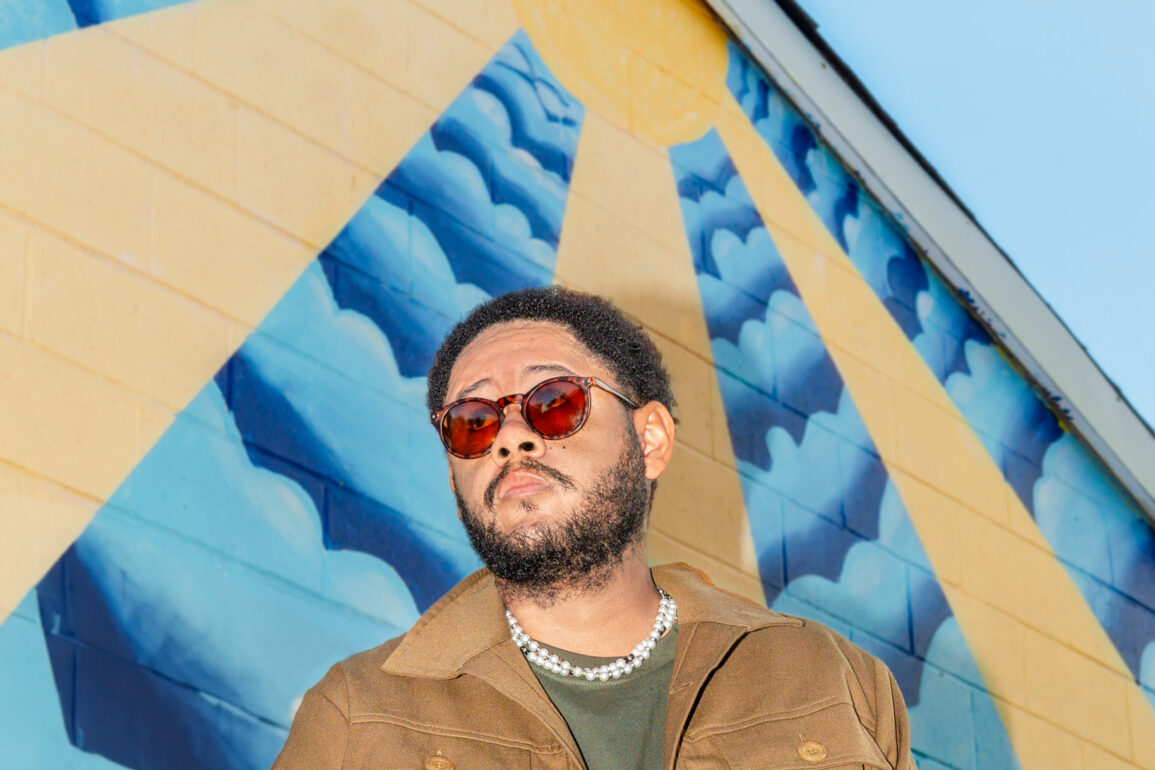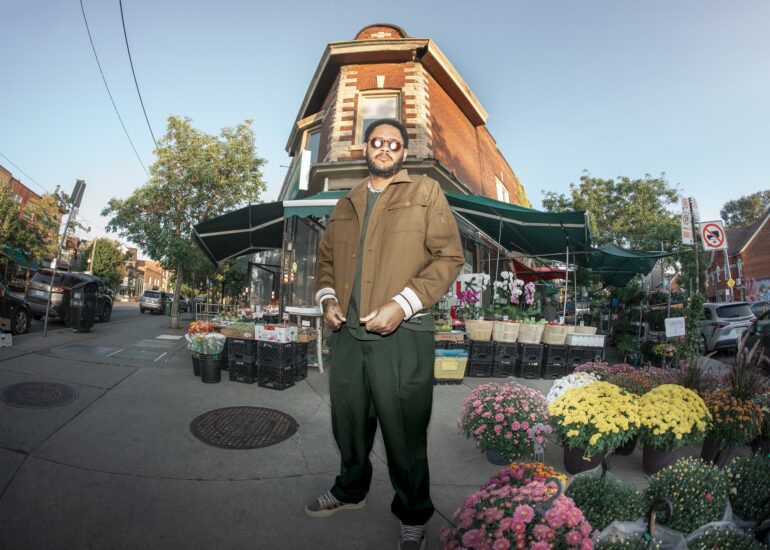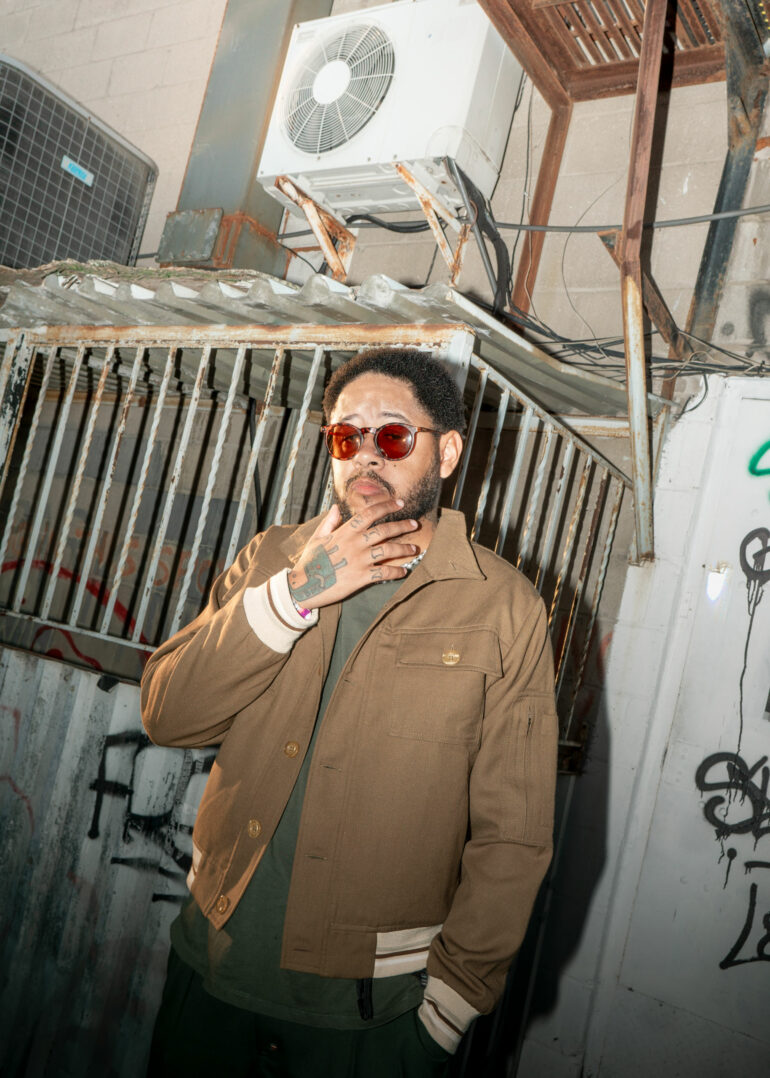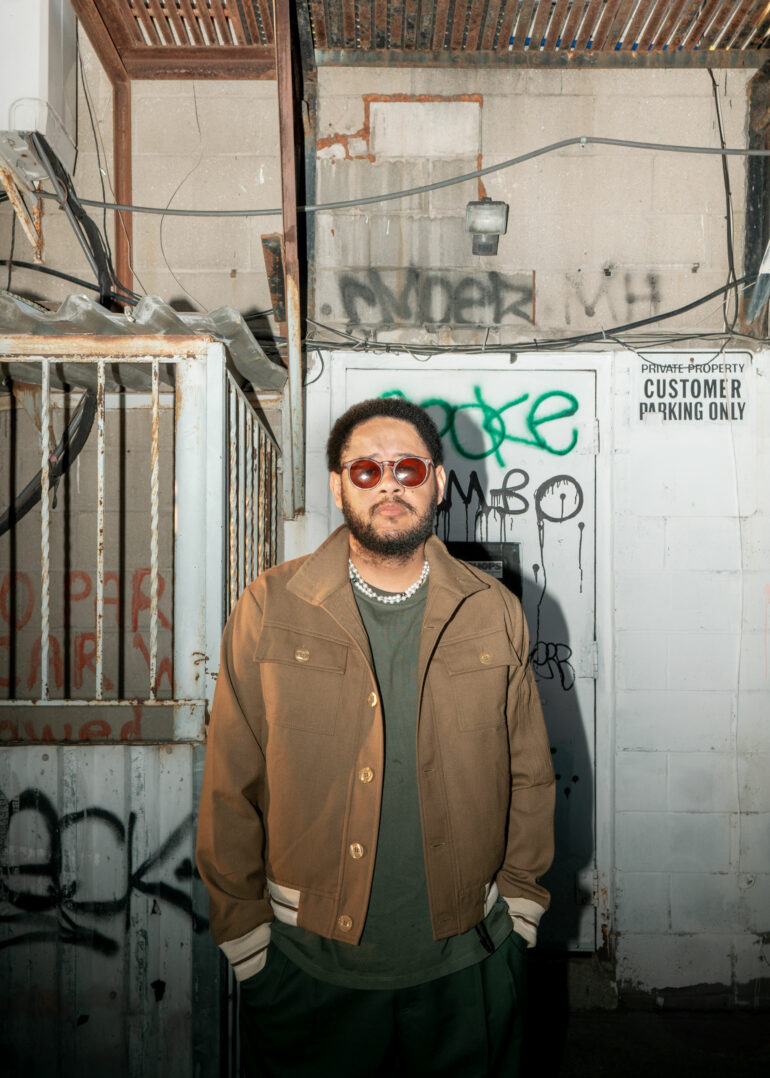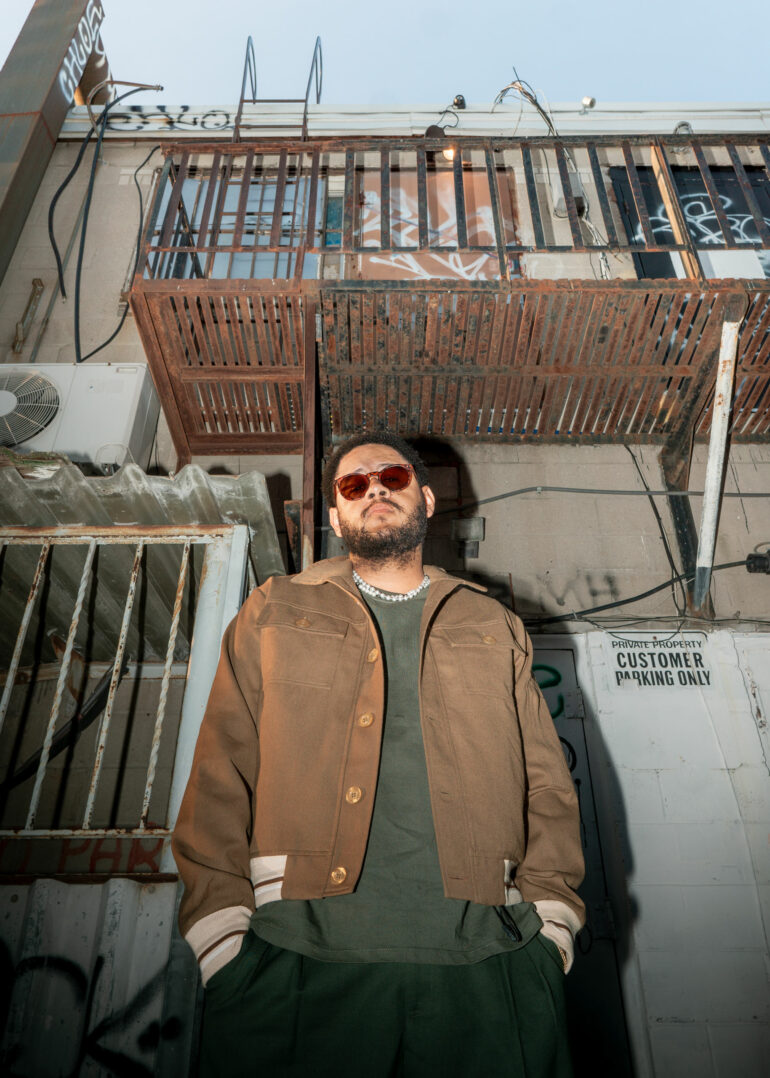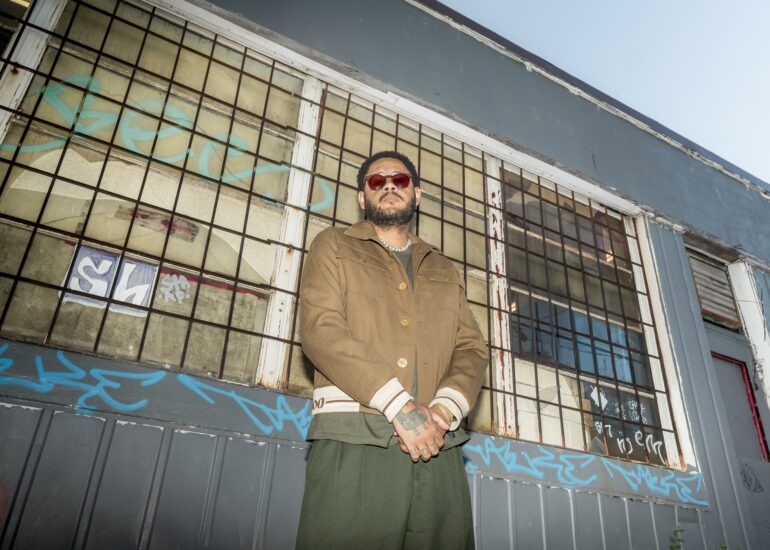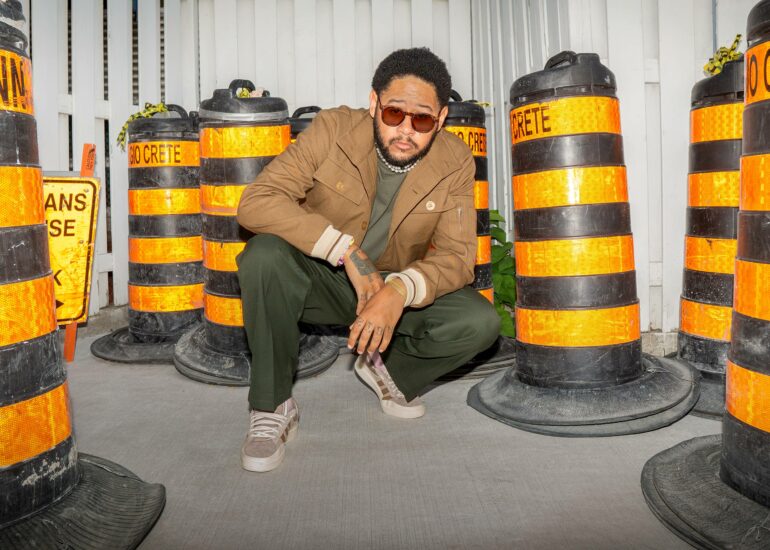When I heard Emicida was playing two sold out shows at The Axis Club in Toronto, I turned to a Brazilian friend and asked, “have you ever heard of this Emicida guy?” She looked at me, like I had landed from mars. It was time to research.
He was born in São Paulo and his journey into the world of rap began in those streets, honing his craft through freestyle battles and underground performances. He draws inspiration from his surroundings, and he uses his music as a platform to shed light on social issues, inequality, and the everyday struggles faced by the people of Brazil. Impressive.
Five days before the show I was able to secure 45 minutes to shoot and interview the rapper—very tight, but doable. On concert day, I realized I hadn’t actually played any of Emicida’s music, my first listen would be at the show.
I walked in, grabbed a drink and stood at the back of the room, waiting. When the house lights went down, he came out in full force and had the audience eating out of his hands within seconds—Brazilian rhythms mixed with hip hop… he pulled a flute out to jam with the band, and later in the evening, a cavaquinho.
At one point, the band transitioned into a cover of Pink Floyd’s “Another Brick in the Wall.” Unexpected and fantastic. During the encore, he conducted the audience like an orchestra—bringing them up, then down to sing quietly. The band was tight, Emicida was on his a-game and the crowd was loving it—jumping, arms in the air and singing along with his every word.
In a world where authenticity is often overshadowed by commercialism, he stands as a beacon of truth, using his artistry to inspire change and ignite revolution. He is a citizen of planet earth dedicated to his people. He is committed to his craft and is the essence of what it means to be an artist. He is Emicida.
LUSO LIFE: When was the last time you heard the name Leandro Roque de Oliveira.
EMICIDA: I hear that name a lot. Certainly… when I’m making love.
LL: Hahaha. Hahaha. Okay.
E: Touché. End of chat. Next question.
LL: A lot of people forget their proper names.
E: No. But there’s something interesting about starting with this question, in some way, in a kind of rebellious way, you, as a teenager, want to tell the world who you are. You replace the name your family gave you with the nickname they give you in the street, right? So you take a certain pride in this invented name. You know, it’s like that with many of my friends. They end up answering more to their nickname than necessarily to an actual name. And I think I’ve been living under the weight of the nickname for so long that I’ve also reflected a lot on the beauty of the name. You know, I think Leandro is a very beautiful name. The name Leandro means gentle man…
LL: Are you gentle?
E: I think I’m the most suspect person to comment on that. I think it suits me. The name is what I try to be.
LL: Why are you Emicida?
E: Emicida (emmy-cee-da) is an expression that was born in the context of Brazil when I was doing freestyle battles and rhyming duels. I used to win a lot of them. People always joked, ‘ele é o homicida dos MCs’ (he’s the killer of MCs). And the name stuck. I am the killer of MCs, and out of that Emicida was born.
LL: For someone who is gentle? Kills gently,…
E: As long as you kill kindly. (laughs)
LL: You finally made it to Toronto—welcome. How does that make you feel?
E: I’m really happy to be here because I’d never been to Canada and I was really curious. I’ve been all the way to the United States, almost to the top of the continent, but I’ve never been this high. Now all I need is Alaska
LL: It’s not that far away.
E: So I’ll ask what I’ve asked everyone that I’ve met here… Have you ever been to Alaska?
LL: No.
E: Nobody goes to Alaska? I’ll have to be that person.
LL: We can go together. [laughs] You’re touring your latest album “AmarElo” and have two sold out shows here in Toronto… surprised?
E: I wouldn’t say surprised. I would say grateful, because I know there’s a very strong Brazilian community here. I know that there is a very strong community of Portuguese speaking people here—the two of us are here now, talking in two forms of Portuguese. As soon as the concerts were announced, we saw tickets sell out. We’ve received hundreds, maybe thousands of messages from people congratulating us. Some from people who don’t even live in Toronto, but decided to come here to attend the concerts because they miss Brazil. They miss Brazilian culture. Some people who are originally from here but connect with my music have sent me messages in English, saying, “Wow! I’ve seen the Netflix film [Emicida: AmarElo – It’s All for Yesterday] and I’d really like to see the show. I’m very happy that it’s coming to Toronto… Vancouver… Montreal.”
LL: “Emicida: AmarElo – It’s All for Yesterday” a documentary celebrating Brazil’s black culture. Why AmarElo? Can you tell us a bit about it?
E: Right. AmarElo We first need to understand it as the combination of two words [Amar=Love & Elo=Link]. Curiously, the combination of these two words results in a third, which is the name of a colour [Amarelo=Yellow]… but that’s not the first intention. The primary intent is the joining of the words amar and elo, as if we were building a link between the two things, you know? The power of love can build this link between human beings. The first inspiration was a poem by a Brazilian poet called Paulo Leminski where he says, “Love is the link between blue and yellow.”
At a time with so much going on globally, I’m talking about more than just the political conflicts or social and racial issues in Brazil. Perhaps it’s because I’m moving around more and travelling the planet. By spending a little more time in various places, you get a broader reading of these conflicts. So, for me, it was urgent to talk about this human capacity to connect. Human beings are social animals. They need each other. That was the basis for this entire project. When it became an album, it had an impact on Brazilian society as well as outside Brazil. The documentary was made to further elaborate on these stories. We wanted to correct some of the gaps and missing information in what we call the history of Brazil. Especially when we look at a city like São Paulo—the largest city in Latin America—and ask ourselves: what is the contribution of black people to the grandeur of this giant metropolis? The film intends to present this and look at it in a more complete way. São Paulo is very proud of its multicultural reality, but the moment this multiculturalism pertains to black people, the information disappears. So it’s interesting to bring all this together and offer São Paulo, Brazil and the world a closer look at what the reality is on the streets of that city and that state.
LL: It’s safe to say that Emicida, with this work in particular, has changed minds and thoughts. It’s practically a critical work that people analyze when they get home and debate with their families. Is that fair to say?
E: I think so, in the following sense: real art is complex. It makes us observe the world and reflect in a different way than we did before contact with that art. It’s as if art cleanses our eyes or bestows us with information, you know? I wouldn’t necessarily say that it’s a purely critical work, because although art fulfils this role, it’s also not the only job it can do. Art is much deeper than that; it touches a place of sensitivity in the human soul within all of us. That’s very interesting to say. We are often put into an automatic modus operandi, as if we were robots or cogs in a machine. We have responsibilities; paying our bills, looking after our children, building our homes, looking after our families, and these responsibilities put us into a kind of airplane mode, where we stop connecting with our surroundings. And that can be very sad. Art is what reawakens our sensibilities and makes us look at the world and perceive it anew—a characteristic that children inherently have. There’s a Latin American thinker, Eduardo Galeano; a poet, journalist and writer, and he says something that I find fascinating, “Children are the only humans who look at the world and see it.” Unfortunately, once we’ve grown up, we often begin to see the world through the lens of our prejudices rather than necessarily seeing the world as it really is. You know when children ask us, “Why do so many people sleep on the streets? Why in such a rich world do so many people not have homes or food?” It’s a message they bring so that we can look at the world again and understand it. That’s the artist’s job: to make people look, to make them aware, to realize that before anything else, the first vocation we all have is to be human.
LL: Look, you talked about feelings, you talked about reflection. How did you feel in Portugal when Noémia de Sousa’s poem was read; “Take everything from us, but don’t take our lives. Don’t take our music.”
E: I love that poem. It’s interesting that you made the connection to Portugal. What is Portugal for a young contemporary Brazilian? The first time I went to Portugal, what fascinated me most while in Lisbon was having contact with hundreds of Africans that I didn’t get to see in Brazil. Brazil often claims Africa in a romanticized way, and so did I for a long time. In Portugal, I was able to get closer to different African communities and in some way, refine my perspective. I got to know them better, being legitimately open to understanding what this cultural exchange is in the 21st century. Through these exchanges I got to know a series of authors. Curiously enough, I met Noémia de Sousa, the poet you mentioned, in Brazil through a friend of mine, a great maestro called Marcelino dos Santos—Marcelino Freire—sorry, I was already turning him into a relative of another poet-De Santos. Marcelino Freire was the one who showed me Noémia’s poem while we were making a record that I had recorded part of in Luanda, Angola, another part in Praia, Cape Verde and a little bit in Madagascar. When he heard my album, he showed me this poem, which then made it into the tour set list. It was so powerful, because it spoke of exactly what we’ve just been talking about; the power of art, of strength, of connection. It goes;
LL: Wow!
E: It is wonderful.
LL: Marvellous. You talked about Africa and how you discovered this Africa in Europe. When you first set foot in Angola, Cape Verde and Madagascar, what did you feel?
E: First I felt a confused energy that felt like a return, you know? The reality of racial inequality in Brazil is where the positive aspect of this aforementioned romanticization comes in. It was very important to romanticize Africa for us at a certain point in our lives. Why was that? Because it was through this construction that we built positive aspects about who we are. We weren’t in soap operas, we didn’t have the best jobs, we weren’t in the best, let’s say, social strata of Brazilian society. Entertainment often mentioned Brazilian African-ness in a pejorative way. So we had—through various thinkers, artists, and intellectuals—to build this Africa, you know? Which was something very positive in that context. But the moment you set foot on the African continent for the first time, there’s a fascinating thing that happens; you pick up a missing piece of that puzzle and it’s in that place that you manage to make a complete turn and understand the magnitude of what the culture of the Africa really is. In large part because it’s bigger than any of us can comprehend.
LL: 54 countries with completely different cultures. Brazilian journalist, Manuel Soares, always says that black Brazilians don’t go to Africa, they return to it. You felt that return?
E: I did. It’s interesting. Transcending the no by going beyond the stereotype of the return thing. And we also have to be careful that the central marker of our relations isn’t just slavery.
LL: Our history doesn’t begin with slavery.
E: That’s right.
LL: It never began with slavery.
E: And this is a kind of trap, this theme. It’s important that we discuss the consequences of colonialism and slavery. It’s a fact. We have to discuss it. Not about why, but about what it is. But this can’t be a limiting factor for everything that Africanness means—our minds need to be connected to other characteristics of what it means to be of African descent, whether in Brazil, Portugal, East Timor or on the African continent itself. That’s where we’ll make the leap that will take us into the future.
LL: Very true. Let’s talk a bit more about your art. When you make music and listen to music, what do you feel? What do you prioritize? The beat? The lyrics? The melody?
E: Early on in my life I wanted to be a DJ. Hip hop has four elements. Breakdancing, graffiti, the DJ, and the MC. I wanted to be a DJ, but it was very expensive. Since I couldn’t afford the equipment, being a rapper was more attainable. All I needed was paper and pen, so I started writing lyrics. I had an aptitude for poetry, I was addicted. To this day, I’m addicted to comic books—I love comics from the United States and Japan, which are my favourites. From this habit of writing, my music became built around the words. If you look closely at what happens, everything that surrounds the word serves it within my music. So I look for the best rhythm, the best harmony and the best arrangements to give the word the leading role it needs. I truly believe in the revolutionary power of dialogue, and it all starts with words.
LL: Do you accept labels? If I call you a writer? Rapper? Hip-hopper?
E: Hip-hoper, rapper, writer… these are all characteristics of things that we produce, you know? And it’s nice to be recognized for these things but I think this is more of a concern for the market than necessarily for artists. I think being an artist suits me. That’s what I do. I do art.
LL: The artist. When is he the writer? When is he Emicida? When is he the guy who goes out to fight for fair causes? You know, sometimes it’s a bit confusing.
E: I agree with you, but that’s not my problem [laughs].
LL: Your lyrics touch a lot on the environment you grew up in. How important is that environment to your art?
E: I think everyone’s art and intellectual output is a reflection of where they grew up. You can dream and build fantastic worlds but in some way you’re reflecting the environment you were born into. I was lucky enough to be born in Brazil in the midst of a very rich culture. I was born in a country whose samba is the deepest, purest, most sublime manifestation of its soul. And from that, I try to continue the greatness of various giants who preceded me. We’re talking about Cartola or Pixinguinha, but also Racionais MC’s—or going further back to Patapio Silva who was another flautist I recently discovered. I think at the start all artists, especially rap artists, have a need to begin with the concrete reality and portray what we see around us. That’s where all these, shall we say, protests come from and this belief that we only make protest music. As we develop, we start to see and perceive other characteristics of the human experience and can flirt more with the abstract. The concrete is still interesting, but so too are the abysses of human experience—it can be such incredibly rich, raw material for an artist. I think you can take any rapper’s first album and they’ll take you through these raw life experiences, but as ones artistry progresses, the subject matter evolves and can become more conceptual. In a way, my art is following the same path.
LL: This activism… Does it work? Has it worked?
E: It works. I’m humbled. In fact, I often tell people that Sueli Carneiro is a real activist. I’m an artist. I understand that people say Emicida is an activist because they recognize the transformative power of my art; how it touches people’s hearts and creates new visions of the world. Ultimately I’m an artist who doesn’t abdicate his status as a citizen. I don’t live on Mars, I don’t live on the Moon. I live on Earth. I care about the Earth, you know? Just like any other citizen. At the end of the day, I’m a musician, an artist.
LL: The musician, the artist…
E: I really like writing songs that work like books. People come back tired on the subway or on the bus and they read a book. From that book they gain another understanding of life. I like that my songs work in a similar way where sometimes people come back to them and have a different perception of the songs themselves, you know? So I’m flattered when people say, ‘Emicida is a great activist’. I’m active in trying to transform the planet in that sense, but I also know that there are people out there who are truly activists. And they not only need our attention, but our empathy. At best, I can be a window that brings the eyes of the world to these people, but the real battle is being carried out by them.
LL: Speaking of writing, I’ve heard that when Elton John writes a song, he knows within the first 15 minutes whether it’s working or not, and if not, he discards it. On the other hand, I’ve heard Djavan keeps a whole collection of unfinished songs. Is this the case with you?
E: I write and abandon quite a lot. It’s very common. I write a snippet of a song, a phrase, a whole verse, a chorus and I save it and leave it.
LL: And when do you return to these unfinished songs?
E: I don’t know, say when I’m about to move out of my house, I might open a box and find that old notebook, open it and say, “Wow, this is good. There’s something here.”
I think the mark of a good song is how it stands up to time. Sometimes I’ll look at the songs people are listening to now and they go back years and years, while others become quickly dated. Good music transcends time. And when you listen to one of these songs in 20 years, it will create a kind of portrait in your heart. It will make you smell the scent of that moment when you first heard it and stir up all those associated memories. In terms of the arrangement, I’ll go as far as saying that just listening to the first five seconds, I’ll know if there’s a future in a song or there’s not. [Laughs]
LL: Any advice for a young person who wants to pursue a career as an MC?
E: The word rap is a fantastic word because it has a beautiful, literal meaning. Rhythm is poetry, you know? The word rhythm reminds me of attention. Being attentive to the rhythm of the world, not just the tempo of the music. But also being aware of the rhythm at which things happen, people move, words pass through the air. Poetry is also in human behaviour. You know, poetry is in nature, in the flowers that are born, in children smiling, in couples meeting, in the moment when you manage to do good for someone you love or for a stranger. If I could give advice to a boy or girl who dreams of being an artist like Emicida, I’d say be aware of the world. Rhythm and poetry are much bigger than just putting a few words on paper. It’s marvellous to be a rapper. I love being a rapper. I love having this intimacy with words. I love being able to build ideas, sensations and sometimes it’s so profound with wordplay that I change people’s body chemistry and they laugh or cry because of it. You can’t just look at it from a technical point of view however, you need to go deeper into things. Take time to really feel and be able to share these truest emotions with the world.
INTRODUCTION: DAVID GANHÃO
INTERVIEW: FRANCISCO PEGADO
PHOTOS: MICHEAL NEAL
